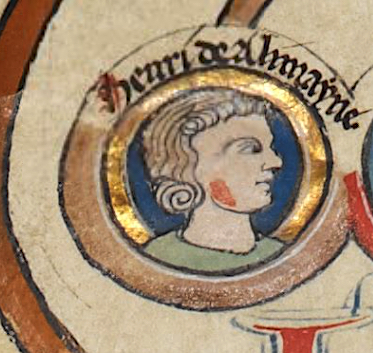Henry of Almain
| Henry of Almain | |
|---|---|
 |
|
| Born |
2 November 1235 Haughley Castle, Suffolk |
| Died | 13 March 1271 (aged 35) Chiesa di San Silvestro, Viterbo, Italy |
| Burial | Hailes Abbey, Gloucestershire |
| Spouse | Constance of Béarn |
| House | Plantagenet |
| Father | Richard, 1st Earl of Cornwall |
| Mother | Isabel Marshal |
Henry of Almain (Anglo-Norman French: Henri d'Almayne) (2 November 1235 – 13 March 1271) was the son of Richard, 1st Earl of Cornwall and his first wife Isabel Marshal. His surname is derived from a vowel shift in pronunciation of d'Allemagne (English: of Germany), so called by the elites of England because of his father's status as the elected German King of the Romans (the King of Almayne).
Henry was knighted by his father the day after Richard was crowned King of the Romans at Aachen, the usual coronation place for German kings. Richard's coronation took place on 17 May 1257.
As a nephew of both Henry III and Simon de Montfort, he wavered between the two at the beginning of the Barons' War, but finally took the royalist side and was among the hostages taken by Montfort after the Battle of Lewes (1264), was held at Wallingford Castle and later released.
In 1268 he took the cross with his cousin Edward, who, however, sent him back from Sicily to pacify the unruly province of Gascony. Henry took the land route with Philip III of France and Charles I of Sicily.
While attending mass at Chiesa di San Silvestro (also called Chiesa del Gesù) in Viterbo on 13 March 1271, he was murdered by his cousins Guy {d.1288} and Simon the younger de Montfort {d.1271}, sons of Simon de Montfort, 6th Earl of Leicester, in revenge for the beheading of their father and older brother at the Battle of Evesham. The deed is mentioned by Dante Alighieri, who took it upon himself to place Guy de Montfort in the seventh circle of hell in his masterpiece, The Divine Comedy, which was written at least 40 years after Henry's death.
...
Wikipedia
